Engage NY Eureka Math 4th Grade Module 5 Lesson 32 Answer Key
Eureka Math Grade 4 Module 5 Lesson 32 Problem Set Answer Key
Question 1.
Subtract. Model with a number line or the arrow way.
a. 3\(\frac{3}{4}\) – \(\frac{1}{4}\)
Answer:
3(3/4) – 1/4 = 2(7/4).
Explanation:
In the above-given question,
given that,
subtract the fractions.
3(3/4) – 1/4.
2(1/4) + 6/4.
2(7/4).
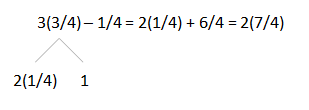
b. 4\(\frac{7}{10}\) – \(\frac{3}{10}\)
Answer:
4(7/10) – 3/10 = 4(7/10).
Explanation:
In the above-given question,
given that,
subtract the fractions.
4(7/10) – 3/10.
4(1/10) + 6/10.
4(7/10).
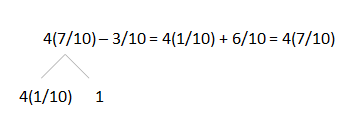
c. 5\(\frac{1}{3}\) – \(\frac{2}{3}\)
Answer:
5(1/3) – 2/3 = 4(4/3).
Explanation:
In the above-given question,
given that,
subtract the fractions.
5(1/3) – 2/3.
4(1/3) + 3/3.
4(4/3).
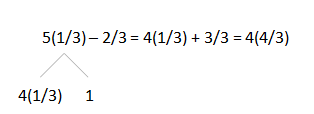
d. 9\(\frac{3}{5}\) – \(\frac{4}{5}\)
Answer:
9(3/5) – 4/5 = 5(23/5).
Explanation:
In the above-given question,
given that,
subtract the fractions.
9(3/5) – 4/5.
5(3/5) + 20/5.
5(23/5).

Question 2.
Use decomposition to subtract the fractions. Model with a number line or the arrow way.
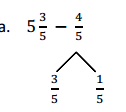
Answer:
5(3/5) – 4/5 = 24/5.
Explanation:
In the above-given question,
given that,
use decomposition to subtract the fractions.
5(3/5) – 4/5.
5 x 5 = 25.
25 + 3/5 = 28/5.
4/5 = 3/5 + 1/5.
28/5 – 4/5 = 24/5.
b. 4\(\frac{1}{4}\) – \(\frac{2}{4}\)
Answer:
4(1/4) – 2/4 = 15/4.
Explanation:
In the above-given question,
given that,
use decomposition to subtract the fractions.
4(1/4) – 2/4.
4 x 4 = 16.
16 + 1/4 = 17/4.
2/4 = 1/4 + 1/4.
17/4 – 2/4 = 15/4.

c. 5\(\frac{1}{3}\) – \(\frac{2}{3}\)
Answer:
5(1/3) – 2/3 = 14/3.
Explanation:
In the above-given question,
given that,
use decomposition to subtract the fractions.
5(1/3) – 2/3.
5 x 3 = 15.
15 + 1/3 = 16/3.
2/3 = 1/3 + 1/3.
16/3 – 2/3 = 14/3.

d. 2\(\frac{3}{8}\) – \(\frac{5}{8}\)
Answer:
2(3/8) – 5/8 = 14/8.
Explanation:
In the above-given question,
given that,
use decomposition to subtract the fractions.
2(3/8) – 5/8.
8 x 2 = 16.
16 + 3/8 = 19/8.
5/8 = 3/8 + 2/8.
19/8 – 5/8 = 14/8.

Question 3.
Decompose the total to subtract the fractions.

Answer:
3(1/8) – 3/8 = 2(6/8).
Explanation:
In the above-given question,
given that,
decompose the total to subtract the fractions.
3(1/8) – 3/8.
2(1/8) + 5/8.
2(6/8).
b. 5\(\frac{1}{8}\) – \(\frac{7}{8}\)
Answer:
5(1/8) – 7/8 = 4(9/8).
Explanation:
In the above-given question,
given that,
decompose the total to subtract the fractions.
5(1/8) – 7/8.
4(1/8) + 8/8.
4(9/8).

c. 5\(\frac{3}{5}\) – \(\frac{4}{5}\)
Answer:
5(3/5) – 4/5 = 4(8/5).
Explanation:
In the above-given question,
given that,
decompose the total to subtract the fractions.
5(3/5) – 4/5.
4(2/5) + 6/5.
4(8/5).
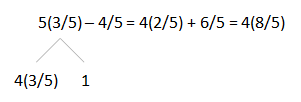
d. 5\(\frac{4}{6}\) – \(\frac{5}{6}\)
Answer:
5(4/6) – 5/6 = 4(9/6).
Explanation:
In the above-given question,
given that,
decompose the total to subtract the fractions.
5(4/6) – 5/6.
4(2/6) + 7/6.
4(9/6).
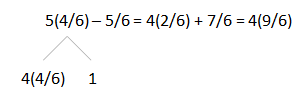
e. 6\(\frac{4}{12}\) – \(\frac{7}{12}\)
Answer:
6(4/12) – 7/12 = 5(16/12).
Explanation:
In the above-given question,
given that,
decompose the total to subtract the fractions.
6(4/12) – 7/12.
5(4/12) + 12/12.
5(16/12).

f. 9\(\frac{1}{8}\) – \(\frac{5}{8}\)
Answer:
9(1/8) – 5/8 = 8(8/8).
Explanation:
In the above-given question,
given that,
decompose the total to subtract the fractions.
9(1/8) – 5/8.
8(1/8) + 7/8.
8(8/8).

g. 7\(\frac{1}{6}\) – \(\frac{5}{6}\)
Answer:
7(1/6) – 5/6 = 6(7/6).
Explanation:
In the above-given question,
given that,
decompose the total to subtract the fractions.
7(1/6) – 5/6.
6(1/6) + 6/6.
6(7/6).
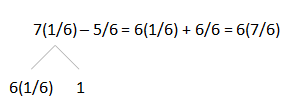
h. 8\(\frac{3}{10}\) – \(\frac{4}{10}\)
Answer:
8(3/10) – 4/10 = 7(13/10).
Explanation:
In the above-given question,
given that,
decompose the total to subtract the fractions.
8(3/10) – 4/10.
7(2/10) + 11/10.
7(13/10).

i. 12\(\frac{3}{5}\) – \(\frac{4}{5}\)
Answer:
12(3/5) – 4/5 = 11(8/5).
Explanation:
In the above-given question,
given that,
decompose the total to subtract the fractions.
12(3/5) – 4/5.
11(3/5) + 5/5.
11(8/5).
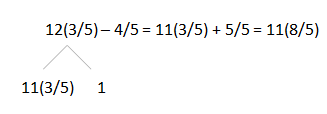
j. 11\(\frac{2}{6}\) – \(\frac{5}{6}\)
Answer:
11(2/6) – 5/6 = 2(6/8).
Explanation:
In the above-given question,
given that,
decompose the total to subtract the fractions.
11(2/6) – 5/6.
10(1/6) + 7/6.
10(8/6).

Eureka Math Grade 4 Module 5 Lesson 32 Exit Ticket Answer Key
Solve.
Question 1.
10\(\frac{5}{6}\) – \(\frac{4}{6}\)
Answer:
10(5/6) – 4/6 = 9(11/6).
Explanation:
In the above-given question,
given that,
decompose the total to subtract the fractions.
10(5/6) – 4/6.
9(4/6) + 7/6.
9(11/6).
Question 2.
8\(\frac{3}{8}\) – \(\frac{6}{8}\)
Answer:
8(3/8) – 6/8 = 2(6/8).
Explanation:
In the above-given question,
given that,
decompose the total to subtract the fractions.
8(3/8) – 6/8.
8(2/8) + 1/8.
8(3/8).
Eureka Math Grade 4 Module 5 Lesson 32 Homework Answer Key
Question 1.
Subtract. Model with a number line or the arrow way.
a. 6\(\frac{3}{5}\) – \(\frac{1}{5}\)
Answer:
6(3/5) – 1/5 = 5(8/5).
Explanation:
In the above-given question,
given that,
decompose the total to subtract the fractions.
6(3/5) – 1/5.
5(2/5) + 6/5.
5(8/5).
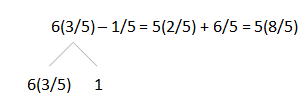
b. 4\(\frac{9}{12}\) – \(\frac{7}{12}\)
Answer:
4(9/12) – 7/12 = 2(6/8).
Explanation:
In the above-given question,
given that,
decompose the total to subtract the fractions.
4(9/12) – 7/12.
5(8/12) + 9/12.
5(17/12).

c. 7\(\frac{1}{4}\) – \(\frac{3}{4}\)
Answer:
7(1/4) – 3/4 = 2(6/8).
Explanation:
In the above-given question,
given that,
decompose the total to subtract the fractions.
7(1/4) – 3/4.
6(1/6) + 4/6.
6(5/6).
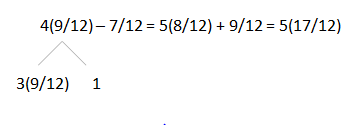
d. 8\(\frac{3}{8}\) – \(\frac{5}{8}\)
Answer:
8(3/8) – 5/8 = 7(11/8).
Explanation:
In the above-given question,
given that,
decompose the total to subtract the fractions.
8(3/8) – 5/8.
7(2/8) + 9/8.
7(11/8).
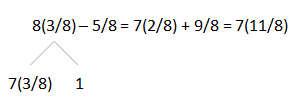
Question 2.
Use decomposition to subtract the fractions. Model with a number line or the arrow way.
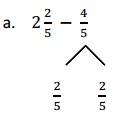
Answer:
2(2/5) – 4/5 = 8/5.
Explanation:
In the above-given question,
given that,
use decomposition to subtract the fractions.
2(2/5) – 4/5.
5 x 2 = 10.
10 + 2/5 = 12/5.
4/5 = 3/5 + 1/5.
12/5 – 4/5 = 8/5.
b. 2\(\frac{1}{3}\) – \(\frac{2}{3}\)
Answer:
2(1/3) – 2/3 = 5/3.
Explanation:
In the above-given question,
given that,
use decomposition to subtract the fractions.
2(1/3) – 2/3.
2 x 3 = 6.
6 + 1/3 = 7/3.
2/3 = 1/3 + 1/3.
7/3 – 2/3 = 5/3.

c. 4\(\frac{1}{6}\) – \(\frac{4}{6}\)
Answer:
5(1/3) – 2/3 = 14/3.
Explanation:
In the above-given question,
given that,
use decomposition to subtract the fractions.
5(1/3) – 2/3.
5 x 3 = 15.
15 + 1/3 = 16/3.
2/3 = 1/3 + 1/3.
16/3 – 2/3 = 14/3.
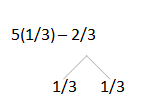
d. 3\(\frac{3}{6}\) – \(\frac{5}{6}\)
Answer:
3(3/6) – 5/6 = 16/6.
Explanation:
In the above-given question,
given that,
use decomposition to subtract the fractions.
3(3/6) – 5/6.
6 x 3 = 18.
18 + 3/6 = 21/6.
5/6 = 3/6 + 2/6.
21/6 – 5/6 = 16/6.
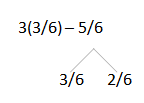
e. 9\(\frac{3}{8}\) – \(\frac{7}{8}\)
Answer:
9(3/8) – 7/8 = 68/8.
Explanation:
In the above-given question,
given that,
use decomposition to subtract the fractions.
9(3/8) – 7/8.
9 x 8 = 72.
72 + 3/8 = 75/8.
7/8 = 5/8 + 3/8.
75/8 – 7/8 = 68/8.

f. 7\(\frac{1}{10}\) – \(\frac{6}{10}\)
Answer:
7(1/10) – 6/10 = 65/10.
Explanation:
In the above-given question,
given that,
use decomposition to subtract the fractions.
7(1/10) – 6/10.
7 x 10 = 70.
70 + 1/10 = 71/10.
6/10 = 5/10 + 1/10.
71/10 – 6/10 = 65/10
 .
.
g. 10\(\frac{1}{8}\) – \(\frac{5}{8}\)
Answer:
10(1/8) – 5/8 = 14/3.
Explanation:
In the above-given question,
given that,
use decomposition to subtract the fractions.
10(1/8) – 5/8.
10 x 8 = 80.
80 + 1/8 = 81/8.
5/8 = 3/8 + 2/8.
81/8 – 5/8 = 76/8.

h. 9\(\frac{4}{12}\) – \(\frac{7}{12}\)
Answer:
9(4/12) – 7/12 = 14/3.
Explanation:
In the above-given question,
given that,
use decomposition to subtract the fractions.
9(4/12) – 7/12.
12 x 9 = 108.
108 + 4/12 = 112/12.
7/12 = 5/12 + 2/12.
112/12 – 7/12 = 105/12.

i. 11\(\frac{3}{5}\) – \(\frac{4}{5}\)
Answer:
11(3/5) – 4/5 = 54/5.
Explanation:
In the above-given question,
given that,
use decomposition to subtract the fractions.
11(3/5) – 4/5.
11 x 5 = 55.
55 + 3/5 = 58/5.
4/5 = 3/5 + 1/5.
58/5 – 4/5 = 54/5.

j. 17\(\frac{1}{9}\) – \(\frac{5}{9}\)
Answer:
17(1/9) – 5/9 = 149/9.
Explanation:
In the above-given question,
given that,
use decomposition to subtract the fractions.
17(1/9) – 5/9.
17 x 9 = 153.
153 + 1/9 = 154/9.
5/9 = 4/9 + 1/9.
154/9 – 5/9 = 149/9.

Question 3.
Decompose the total to subtract the fractions.
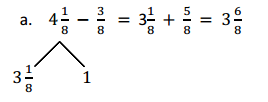
b. 5\(\frac{2}{5}\) – \(\frac{3}{5}\)
Answer:
5(2/5) – 3/5 = 4(7/5).
Explanation:
In the above-given question,
given that,
decompose the total to subtract the fractions.
5(2/5) – 3/5.
4(1/5) + 6/5.
4(7/5).

c. 7\(\frac{1}{8}\) – \(\frac{3}{8}\)
Answer:
7(1/8) – 3/8 = 6(9/8).
Explanation:
In the above-given question,
given that,
decompose the total to subtract the fractions.
7(1/8) – 3/8.
6(1/8) + 8/8.
6(9/8).

d. 3\(\frac{3}{9}\) – \(\frac{4}{9}\)
Answer:
3(3/9) – 4/9 = 2(12/9).
Explanation:
In the above-given question,
given that,
decompose the total to subtract the fractions.
3(3/9) – 4/9.
2(3/9) + 9/9.
2(12/9).
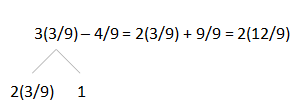
e. 6\(\frac{3}{10}\) – \(\frac{7}{10}\)
Answer:
6(3/10) – 7/10 = 5(13/10).
Explanation:
In the above-given question,
given that,
decompose the total to subtract the fractions.
6(3/10) – 7/10.
5(2/10) + 11/10.
5(13/10).

f. 2\(\frac{5}{9}\) – \(\frac{8}{9}\)
Answer:
2(5/9) – 8/9 = 1(5/9).
Explanation:
In the above-given question,
given that,
decompose the total to subtract the fractions.
2(5/9) – 8/9.
2(4/9) + 1/9.
1(5/9).
